The Josh Miner ’43 Experiential Education Award was initiated by the Friends of Outdoor Action Board in 1995. The award is named in honor of Josh Miner of the Princeton Class of 1943. As a founding trustee of Outward Bound, Josh Miner was instrumental in bringing the philosophy of Kurt Hahn to the U.S. and in establishing the first U.S. Outward Bound Schools. In celebration of Josh’s significant influence on the development of experiential education in the U.S.A., the Miner Award is presented to a graduate of Princeton University who has provided outstanding leadership in the fields of experiential or outdoor education. To continue the tradition of experiential learning at Princeton, the award winner serves as a member of a panel on experiential education held at Princeton. A certificate is presented to the award winner.
Josh passed away on January 31, 2002. His legacy will continue to live on through the thousands of programs that grew from the seed that he planted. More information on Josh is available at Josh Miner Leadership.
2010 Recipients
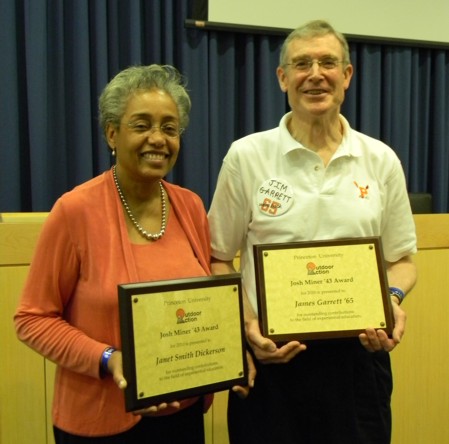 Janet Smith Dickerson
Janet Smith Dickerson
Janet Smith Dickerson, Princeton's first vice president for campus life, was selected as one of this year's recipients of the Miner Award. Janet is the first University staff member to receive the Miner Award.
Dickerson, who joined the Princeton administration in 2000, has devoted a career of nearly 40 years to students at four U.S. colleges and universities. During that time she was an ardent supporter of the Outdoor Action Program helping to expand financial aid for students to participate in the program, encouraging the development of the Leader Training Program, and overseeing the transition of Outdoor Action back into the University under the Vice President for Campus Life Office. In reflecting on areas where she felt she has contributed the most at Princeton, Dickerson constantly listed the people, groups and offices that have helped her in her endeavors. Some of the other areas where Dickerson felt she and others have made significant progress included:
• the thriving of the Frist Campus Center, which some administrators feared might be a "white elephant" and which has become "central to all of our lives," she said.
• the expansion of facilities and the building of a community of friends groups in athletics.
• the expansion of the mission of the Office of Religious Life to include support of and outreach to students from all the major religious backgrounds, including the addition of a coordinator for Muslim life and a coordinator for Hindu life.
• the establishment of the Lesbian, Gay, Bisexual, Transgender Center in Frist and enhanced support for the other cultural centers.
• the flourishing of the Pace Center, bringing under one umbrella the University's civic engagement efforts.
• the growth of opportunities for graduate students, including "McCarter Nights" and opportunities for them to serve as resident graduate students in the residential colleges.
• the work of the Undergraduate Life Committee, which she co-chairs with a student and has helped deal with issues including substance-free sections and smoking in the dorms, alcohol, health services, career services, the bookstore, transportation and parking, public safety, race relations, independent student issues, students with disabilities, and economic equity.
• the efforts -- such as Sustained Dialogue, which Dickerson has been instrumental in supporting -- to increase understanding between divisions in society including race, gender, religion and social class.
• the success of efforts to enhance the presence and voices of students at University trustees' and other leadership meetings, and to make the Princeton community a more inclusive place for all.
Jim Garrett '65
Jim Garrett '65 began his long association with Outward Bound in 1964 at the Hurricane Island Outward Bound School, where, over the years, he served as a sea course instructor (1965-74), then as a member of the Program and Safety Committee of the Board of Trustees and of the Corporation (1993-2004). He currently serves Outward Bound USA as the Director of the National Service Initiative. He is also the team leader for Outward Bound USA’s Instructor Judgment Training Curriculum Project and has presented training workshops for the Wilderness Risk Managers’ Conferences (2000 through 2009), the Association for Experiential Education Conference (2004-05 ), the Wilderness Education Association Conference (2003), and to the Outward Bound International Conference 2000 (in Sabah, Malaysia), as well as for all the US Outward Bound Schools. He is a member of the Board of Advisors of Outward Bound USA, the Board of the Baltimore-Chesapeake Bay Outward Bound Center (BCBOBC), and serves as chair of the BCBOBC Program and Safety Committee.
In addition to his work with Outward Bound, Garrett is a 1973 alumnus of a five-week NOLS Wilderness Leadership course. For 30 years, he taught Middle and High School students in the fields of English, World Religions, and Human Values in two public and five independent schools, and he also established outdoor adventure programs for International College, Beirut, Lebanon, and The Gilman School in Baltimore, MD. He has been a member of the Advisory Board for Princeton University’s Outdoor Action Program for many years, and in 1999, he served as interim director of Harvard University’s First-Year Outdoor Program.
2008 Recipients
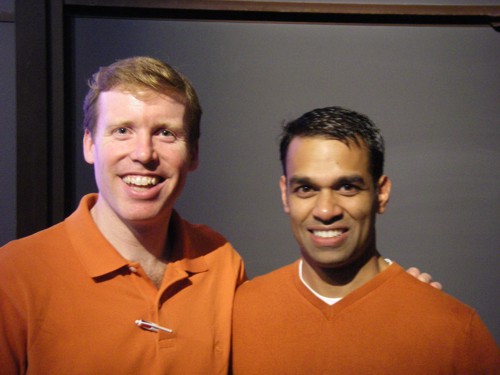
Temp Keller '98 and Rajiv Vinnakota '93
Temp Keller '98
Temp Keller is the Founder and President of RISE (Resources for Indispensable Schools and Educators), an award winning non-profit organization that exists to retain effective teachers in public schools serving low-income communities.
Teachers are the key to student learning, yet up to 70% of all new teachers in low-income communities leave within their first five years. Since work environment is the top driver of attrition, RISE helps administer an anonymous teaching conditions survey at Partner Schools. Results are shared with existing staff and potential hires to drive school accountability and improvement. In so doing, RISE provides the information, transparency, and incentive for schools to be both high achieving and highly sustainable—increasing effective teacher retention and improving student learning. RISE currently works with more than 100 schools and 2,500 teachers between the San Francisco Bay Area, Los Angeles, and Chicago.
Temp previously taught fifth grade at the East Palo Alto Charter School in East Palo Alto, CA, where he now serves on the school's Advisory Board. He received his B.A. in Politics from Princeton University and his Masters in Business Administration from The University of Chicago.
Rajiv Vinnakota '93
Rajiv Vinnakota is co-founder and managing director of The SEED Foundation. Prior to co-founding SEED, Rajiv was an associate at Mercer Management Consulting, where he worked on strategic and financial projects in a variety of industries. He has been involved with programs for inner-city and adjudicated children and served on the board of The Empower Program, which works with youth to end the culture of violence.
He graduated from Princeton University with a degree in molecular biology and a certificate of studies from the Woodrow Wilson School of Public Policy. Rajiv is an Echoing Green fellow, an Ashoka fellow and a former trustee of Princeton University. He now serves his alma mater as the national chair for Annual Giving. For his work at The SEED Foundation Rajiv was named a Washingtonian of the Year by Washingtonian magazine and has received the Manhattan Institute's Outstanding Social Entrepreneurship Award, the Princeton Club of Washington's Community Service Award, and an Oprah Winfrey "Use Your Life" Award. Rajiv is married and has one daughter and two cats.
2007 Recipient - 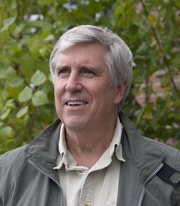 Brian Rosborough '62
Brian Rosborough '62
Founding Chairman of Earthwatch Institute, Brian A. Rosborough has been a pioneer in the environmental field. During his 25-year tenure as CEO, Rosborough supported innovative research in the rainforest canopy. Since its founding in 1971, Earthwatch has supported over 3000 scientific expeditions in 120 countries to investigate and monitor environmental change. More than 80,000 volunteers have contributed about $60 million and over 10 million hours time and talent to essential fieldwork. Among them have been 10,000 teachers and students sponsored on scholarship. Today, Earthwatch Institute continues to be a major sponsor of scientific inquiry, currently supporting 130 projects annually to document changing world conditions. These explorations search for solutions to sustainability, delving into problems such as global warming, habitat destruction, loss of biodiversity, and public health issues such as access to clean water, and the preservation of our cultural and biological heritage.
Earthwatch partners with the Explorers Club to identify young explorers and students for assignments to expeditions where they have a career interest. Both organizations are improving public understanding of the science of conservation.
Mr. Rosborough serves on civic and educational boards in fields of interest. Recently he advised or designed projects for Ossabaw Island Foundation, Deerfield Academy, Tulane University, the Rocky Mountain Institute, Cape Cod National Seashore, International Development Enterprises, Digital Nations, the UN ICT Task Force, and MIT Media Lab.
Prior to joining Earthwatch , Mr. Rosborough was an investment banker in New York and served as First Lieutenant on a U.S. destroyer in southeast Asia. He lives in Concord, MA, a mile from Walden's Pond, with his wife Lucy Carlborg, a foundation trustee and former book publisher, their two children, Annabelle and Davis, and other wildlife.

2006 Recipient - Marty Johnson '81
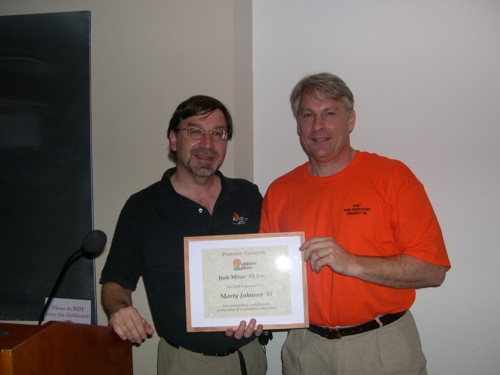 Marty Johnson is President and Founder of Isles, Inc., a Trenton-based community development organization. Founded in 1981 when Marty was a senior at Princeton University, Isles manages self-help programs in community planning and research, real estate development, environmental health, urban agriculture, job training and education, wealth creation and regional organizing and analysis.
Marty Johnson is President and Founder of Isles, Inc., a Trenton-based community development organization. Founded in 1981 when Marty was a senior at Princeton University, Isles manages self-help programs in community planning and research, real estate development, environmental health, urban agriculture, job training and education, wealth creation and regional organizing and analysis.
Marty has worked to build the capacity of the community development sector statewide and on the national level. Johnson is a founder and former director of the New Jersey Community Capital, founding trustee of the Housing and Community Development Network of New Jersey, founder and current chair of the New Jersey Regional Coalition and member of the Mercer Trenton African American Chamber of Commerce (MTAAC) and other organizations. He is the founder and former co-chair of the national Success Measures Project, a project of the Development Leadership Network. He is a trustee of the Capitol Health Systems, overseeing two hospitals in Trenton. He is also a member of the national advisory committee to the Council of Churches. In 1996, he taught as a visiting fellow at the Princeton University Woodrow Wilson School of Public and International Affairs. He is also a member of the board of trustees and Executive Committee of Princeton University.
Marty has received a presidential “Take Pride in America Award”, a Princeton University Peace Prize, a New Jersey Pride Award for Community Development, and the Humanitarian of the Year Award from the New Jersey Chapter of the National Conference on Community and Justice.
2005 Recipients - Jane Fremon '75 and John Page Williams '65
Jane Fremon '75
One of the things that stands out about Jane is she has been and continues to be, a pioneer, a founder of things as you’ll see in a moment. Jane grew up in Princeton and graduated from Princeton High School in 1970. She entered Princeton University with the class of ’74, the second class of women. While at Princeton she became aware of the Princeton-Blairstown Center , then known as the Princeton Summer Camp, and worked there as Waterfront Director during the summer of 1973. She spent the following academic year hopping from one national park to another in the U.S. and Canada, and then returned to Princeton to graduate with a degree in English in 1975. During her Princeton years, Jane was a founding member of the women’s swimming team, one of the first varsity sports for women at Princeton. During her time at Princeton and afterwards she spent many hours mastery the art of ceramics in the basement of 185 Nassau as a student of the famous potter Toshiko Takezu.
Following graduation Jane worked at the Roosevelt Public School in Roosevelt, New Jersey, while pursuing a master’s degree from the Bank Street College of Education in New York City. She went on to Princeton Day School, where she taught 5th grade English and history for six years. In 1987 following a lifelong ambition of starting a school that addresses the holistic learning needs of students, she founded the Princeton Friends School with 19 students. She and others believed that a school guided by Quaker values and practice would offer families in the Princeton area an important educational alternative. Eighteen years later, the school has blossomed with an enrollment of 125 students in pre–kindergarten through eighth grade and with thirty faculty and staff. Through her efforts and the efforts of the supportive school community the school moved into the new Schoolhouse on the grounds of the Princeton Friends Meeting. In the autumn of 2000, Princeton Friends received accreditation through the New Jersey Association of Independent Schools.
Jane serves on the boards of the Princeton-Blairstown Center, the Principals Center of the Garden State, and the Friends Council on Education. She lives in Yardley with her rock-climber and beekeeper husband Paul Scutt and their nine year-old daughter Georgia.
John Page Williams '65
John Page Williams ’65 has been a member of the Chesapeake Bay Foundation staff since 1973, serving as a field educator, program administrator, and fundraiser while running field trips by canoe, outboard skiff, and workboat on every river system in the Chesapeake. Prior to his starting at CBF he worked as an instructor at the Hurricane Island Outward Bound School, was a teacher at Mercersburg (PA.) Academy and St. Christopher's School in Richmond, VA. He’s also the only person I know who holds a U.S. Coast Guard Master's License, for 50 ton power vessel with unlimited passengers.
The Chesapeake Bay Foundation (CBF), founded in 1967, is the largest conservation organization dedicated solely to saving the Chesapeake Bay watershed. It is supported by more than 116,600 active members and has a staff of approximately 165 full-time employees. CBF’s motto, Save the Bay, defines the organization's mission and commitment to reducing pollution, improving fisheries, and protecting and restoring natural resources such as wetlands, forests, and underwater grasses. CBF headquarters is in Annapolis, MD, and has state offices in Maryland, Virginia and Pennsylvania. CBF also operates 15 environmental education programs.
CBF has been a catalyst for bold and creative solutions to Bay problems. Staff members set the agenda, serve as watchdogs, and speak out on behalf of the Chesapeake Bay to business, government, and the public. CBF's environmental education program introduces people to the wonders of the watershed and works to heighten sensitivity, increase knowledge, and empower citizens to take positive action toward the Bay's protection and restoration both in the classroom and in the field.
In his current position as Senior Naturalist, he writes Chesapeake Notebook, a bi-weekly column on interesting places around the Bay for CBF’s web site (www.cbf.org) and local papers in Virginia and Maryland. In addition, as a free-lancer, he reviews boats and marine electronics and writes on fishing and environmental issues for BOATING, Chesapeake Bay, & Offshore Magazines.
2004 Recipient - Philo Elmer '69
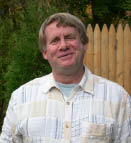 Warren "Philo" Elmer has served the experiential education field for nearly four decades. He has functioned variously as a teacher, environmental educator, adventure programmer, entrepreneur, program director, executive director, and board member. He co-founded the Association for Challenge Course Technology, brought diverse programs together to form the Association for Experiential Education's mid-Atlantic Region, and sat on AEE's board. In addition to being involved in both Outdoor Action and Princeton-Blairstown Center in virtually every capacity imaginable, he has helped introduce or substantially expand experiential programming at dozens of schools and universities, dozens of treatment centers and corporate education facilities, and literally hundreds of camps and outdoor centers. He has led adventure programming in more than forty states and overseas, working with well over 200,000 participants in the process. From the Boy Scouts to the Girl Scouts, from Project USE to Project Adventure, from Outward Bound to Inward Bound, there are few if any organizations in our field Philo has not influenced.
Warren "Philo" Elmer has served the experiential education field for nearly four decades. He has functioned variously as a teacher, environmental educator, adventure programmer, entrepreneur, program director, executive director, and board member. He co-founded the Association for Challenge Course Technology, brought diverse programs together to form the Association for Experiential Education's mid-Atlantic Region, and sat on AEE's board. In addition to being involved in both Outdoor Action and Princeton-Blairstown Center in virtually every capacity imaginable, he has helped introduce or substantially expand experiential programming at dozens of schools and universities, dozens of treatment centers and corporate education facilities, and literally hundreds of camps and outdoor centers. He has led adventure programming in more than forty states and overseas, working with well over 200,000 participants in the process. From the Boy Scouts to the Girl Scouts, from Project USE to Project Adventure, from Outward Bound to Inward Bound, there are few if any organizations in our field Philo has not influenced.
Yet to limit a description of Philo's accomplishments to a recitation of his resume would, I am certain, actually to understate his impact on experiential education. More than that, it would waste an opportunity to talk a bit about what experiential education is all about.
I first met Philo in 1987 -- fall of my junior year at Princeton. He stuck his head in the OA equipment room where I was busy stealing m&m's left over from frosh trips and told me about program he'd be doing for one of the area middle schools the next week, and did I want to come along and lead New Games for a group of seventh graders. I explained that I had never led New Games for seventh graders -- only for college students. "Well," he explained with a twinkle in his eye, "there's a first time for everything. You'll do fine."
And you know, he was right. Mind you I exhausted my complete portfolio of New Games (all six of them) in the first thirty minutes of a two hour program...but it turns out that seventh graders don't know the difference between a New Game and an Old Game and Something That Really Isn't a Game So Much As Something That We Made Up On the Spot. In other words, ninety minutes of "Let's See Who Can Run and Scream the Longest Before Running Out of Air" rounded out the agenda just fine.
I asked Philo years later what in the world he was thinking, leaving a virtual rookie alone with twenty seventh graders. His answer was telling: "You were a trained OA leader, so I knew you'd keep them safe. We were in a fenced field, so I knew they couldn't escape. We had safety, we had containment -- that's when you cut loose and try new things!"
And for seven years, I was the direct beneficiary of that philosophy of staff development. The first time I supervised a high ropes course by myself...the first time I facilitated a corporate group on my own...the first time I spoke at a conference...the first time I contemplated opening a regional office...and the first time I seriously considered taking over the firm for Philo....each time my reservations, apprehensions, and objections were met by the same two questions: "Can you keep things safe?" he would ask. "Can you keep the chaos contained?" If my answers were yes and yes, I'd get a familiar, knowing smile. "Go for it," he'd tell me. "You'll do fine."
Working alongside Philo, I found myself challenged at every turn, presented with opportunity after opportunity not to hear the answers, not to see the answers, but rather to discover answers for myself. It was, in the truest sense of the word, an adventure.
The success of that approach, and to no small extent Philo's legacy to the field, is the number of people who could have stood in my place today and shared essentially the same story I've just told. Since 1985 alone more than a dozen of Philo's associates have gone on to found new organizations in our field. At least thirty more are in leadership positions in experiential education, and no fewer than one hundred currently serve as teachers, counselors, and facilitators. Many others today actively apply their experiences to other endeavors, serving as environmental lobbyists, risk management consultants, magazine editors, conference center managers, and ministers....each of us, I feel certain, seeking to challenge, engage, and involve those around us even as we ourselves were challenged.
In honoring Philo today, I would like to close with a passage familiar to all who have had the privilege of sharing adventures with him...words penned by Terry Russell which summarize much better than I can the essence of what both this man and this man's craft are all about:
So why do we do it?
What good is it?
Does it teach you anything?
Like determination? invention? improvisation?
Foresight? hindsight?
Love?
Art? music? religion?
Strength or patience or accuracy
or quickness or tolerance or
Which wood will burn and how long
is a day and how far is a mile
And how delicious is water and smoky
green pea soup?
And how to rely
On your
Self?
On behalf of the many, many people you have taught, trained, coached, facilitated, mentored, and influenced, Philo, thank you for helping us to be part of the "we" who "do it."
Patrick Farrell '89
2003 Recipient - Christine Clarke '83
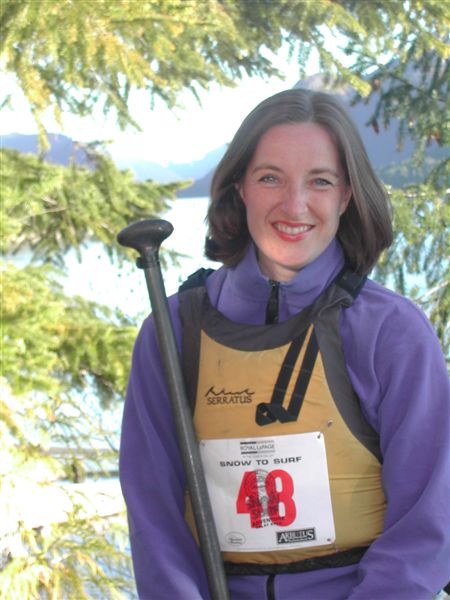
Christine Clarke '83 brings a deep sense of purpose coupled with disciplined pragmatism to directing Strathcona Park Lodge & Outdoor Education Centre (SPL), a role she has shared for the past 10 years with husband Jamie Boulding. Founded in 1959 by the visionary Boulding Family, Christine has held strategic, financial, and administrative reins to enable privately owned SPL to remain Canada's premier outdoor education centre, in a competitive environment populated by public and non-profit institutions. SPL's programs, (including the renowned Canadian Outdoor Leadership Training (COLT) Semester established in 1977)'teach the wonder, spirit and worth of people and the natural world through outdoor pursuits.' Programs nurture an ability to respond creatively on a local level to global issues by enhancing a sense of belonging - as expressed through the Strathcona Circle of values (stewardship, more with less, challenge by choice, living on the edge, the Happy Warrior, and generosity of spirit).
As befits an experiential learner, Christine draws and builds on her varied experiences, including: as Olympian (1984) and medallist at World Rowing Championships ('78, '85 & '86), provincial public policy advisor and consultant (to 8 British Columbia ministries '89 to '93), as former governor/director of tourism, education and health boards (Campbell River Tourism, North Island College, Community Health Council), as parent of 3 daughters, Zannah (6), Kyra (5) and Rose (3), and as outdoor enthusiast. She also values her formal education (A.B. Sociology, Princeton University 1983, Masters of Public Administration, University of Victoria 1992).
While many businesses struggle with the idea of community, the wilderness environment in which Christine lives, works, hosts clients, students, staff and guests, and raises her family, demands an integration of business and community, providing the ultimate test of 'being real' and living the values expoused and taught by SPL.
2002 Recipient - Greg Farrell '57
Greg Farrell graduated from Princeton in 1957. He served as a high school English teacher at the Punahou School in Hawaii. After that he served in the US Army. He later served as assistant director of Admissions at Princeton and was a reporter for the Trenton Times. He was a Ford Foundation Fellow in Urban Affairs at Rutgers from 1962-1963. In the mi 60's Greg was the Executive Director of United Progress, Inc., the Trenton, New Jersey Anti-Poverty Program.
In 1967 through 1970 he served as the Assistant Commissioner of the New Jersey Department of Public Affairs and was a visiting lecturer at the Woodrow Wilson School of Public and International Affairs. From 1970 to 1990 Greg served as the Executive Director of the Fund for the City of New York, a private operating foundation and public charity established by the Ford Foundation in 1968 to help government and non-profit agencies improve the management of public services and the quality of life in New York City.
In 1990 Greg joined Outward Bound, the non-profit adventure and service education organization started in the US by Josh Miner in 1962. Greg became the President of Expeditionary Learning Outward Bound, a division of Outward Bound, Inc. Expeditionary Learning Outward Bound is a proven design for comprehensive school reform that helps transform schools into places where expectations, standards and student achievement are high, and instruction and the school culture encourage habits and values that will sustain students in adult life. There are currently 115 schools actively implementing the Expeditionary Learning Outward Bound design in a diverse group of districts in 31 states, the District of Columbia, and Puerto Rico. Expeditionary Learning Outward Bound is one of eight comprehensive, research-based reform designs selected and supported by New American Schools, a Washington, DC-based non-profit school reform organization.
In addition to his work at Outward Bound, Greg is a founding trustee of the Literacy Assistance Center in New York, a not-for-profit organization dedicated to improving the quality of life of New York literacy programs. He is also a member of the Board of Managers of Camp Dudley, a YMCA camp for boys in Westport New York and a member of the board o f the Yurt Foundation in Bucks Harbor, Maine.
His publications include one book: A Climate of Change: The New Haven Story published by the Rutgers University Press as well as several articles and book chapters.
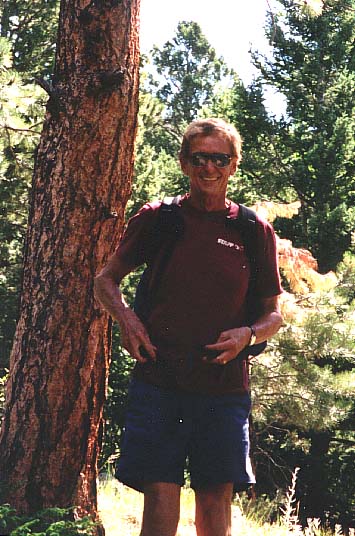 2001 Recipient - John Danielson '58
2001 Recipient - John Danielson '58
After graduating from Princeton in 1958 and spending some time in various administrative offices of the University, John took on the role of Executive Director of the Princeton Summer Camp (later to become the Princeton-Blairstown Center). John and his fellow visionaries retooled the now 273 acre site into a place where urban youth, caught up in the ever deepening struggle against poverty, the lure of gangs and drugs, lack of a high school degree and it's deadening impact on hope, could learn that trust and teamwork can overcome seemingly impossible obstacles, and that challenge, managing failure and success are powerful tools for building self confidence and a rewarding sense of accomplishment.
Equal to John's vision for racial equality was his passion for the power of nature and everyone's responsibility for the environment. Far ahead of his time, John embraced the need for sustainability and environmental justice. Under his leadership, Blairstown was transformed from reliance on traditional forms of energy to that of hydro, solar and wind. John was instrumental in the development of Outdoor Action from its early days.
John passed away in April 2009 after a heroic struggle with cancer. His legacy lives on through the tens of thousands of lives he touched.
2000 Recipient - Larry Morris '69
Larry Morris has served at the Quebec-Labrador Foundation for the past twenty-five years. You can read about Larry in an article that appeared in the Daily Princetonian earlier this spring..
Larry Morris grew up in New York and Connecticut. He graduated from Princeton in 1969. Larry's graduation present was a trip to Alaska in the summer of 1969. He recalls vividly camping on a remote lake in Katmai listening to a distant radio signal of Neil Armstrong's taking his "one large step for mankind." The Alaska trip had a profound impact on him, as had earlier trips to places like the Everglades National Park. It was clear that a strong connection to the environment would always be at the forefront of his career interests.
After serving in the Armed forces from 1969 - 1972, Larry returned and started to focus on the notion of applying management structure to the emerging environmental movement which, at that time, consisted principally of charismatic, entrepreneurial individuals, most of whom had little interest and no experience in running not-for-profit organizations. After flirting briefly with an MBA at Harvard Business School, Larry transferred to Cornell to earn both a masters and doctoral degree from the Department of Natural Resources.
Larry did his Master's thesis on an Environmental Intern Program at the Massachusetts Audubon Society. He served first as an intern and in the next year as an administrator for the program. This experience confirmed his belief in the benefits to and contributions from a work force of young people. Larry found that having young people work in service to the environment was powerful tool for "transforming youth into citizens." In 1975, Larry met the founder of the Quebec-Labrador Foundation, Bob Bryan and began his long association with QLF.
The focus of QLF has always been on creating a strong student volunteer program dedicated to working with young people in the rural communities of eastern Canada and northern New England. The cultural exchange benefits for the young QLF volunteers have proven to be the fiber that binds the organization even today. QLF continues to provide scholarships for young people in the region's rural communities, which maintains a connection between QLF summer experiences and formal educational training that would be unavailable otherwise.
Morris became President of QLF in 1988. During his tenure at QLF Larry has accomplished a great deal to expand this vibrant community-based program. He built a formal, year-round internship program directed toward undergraduate and graduate students from across North America. The second innovation was the creation of an environmental division of QLF, as the "Atlantic Center for the Environment." Working with a similar QLF community-based approach, the Atlantic Center added a new environmental programming dimension to QLF's service focus. Over he past few years QLF has extended its borders internationally with formal environmental exchanges with Central Europe, the Middle East, as well as Latin America and the Caribbean
For the last 20 years QLF has grown as a not-for-profit organization (known internationally as an NGO) whose unique style responds to its mission statement: (1) supporting rural communities and the environment of eastern Canada and New England with emphasis on encouraging local leadership; (2) and creating models for stewardship of natural resources and cultural heritage which can be applied elsewhere.
In the 21st Century, Larry continues to guide the organization using new networks and technologies to connect our region with others around the world facing similar issues associated with accelerated change and its impact on rural cultures and communities. QLF will continue to use education and exchange as tools to help future generations make decisions that affect their rural communities.
Larry has had the good fortune to be at one place long enough - three decades following the first Earth Day - to see in detail the impact of enormous changes on one region. He will strive to keep QLF relevant for rural communities, sensitive to their needs, and a trusted listening post with which these communities can communicate their wishes, dreams, and aspirations to meet the challenges of the 21st century. Larry has taken the mentor relationship model of one person serving another and expanded it to serve as the basis of QLF's efforts across the globe. Each QLF program uses mentoring as a metaphor to establish a relationship between the volunteers and the communities that focuses on the needs of the communities. As a mentor himself, Larry has influenced countless generations of QLF volunteers and people in the communities that he so diligently serves. He has thoughtfully used experiential learning to educate and empower people and communities transforming them into better citizens. It is my great pleasure to present this year's Josh Miner Class of '43 award for Experiential Education to Larry Morris.
1999 Recipient - Rick Curtis '79
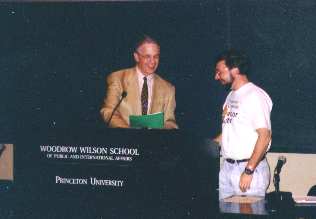 The Josh Miner ’43 Experiential Education Award was established five years ago by the Friends of Outdoor Action. It is names for an alumnus who served as a founding trustee of Outward Bound and who was instrumental in bringing the program to the U.S. The award is presented each year at the time of Outdoor Action’s reunion gathering to a graduate of Princeton who has provided outstanding leadership in the fields of experiential or outdoor education
The Josh Miner ’43 Experiential Education Award was established five years ago by the Friends of Outdoor Action. It is names for an alumnus who served as a founding trustee of Outward Bound and who was instrumental in bringing the program to the U.S. The award is presented each year at the time of Outdoor Action’s reunion gathering to a graduate of Princeton who has provided outstanding leadership in the fields of experiential or outdoor education
This year’s recipient of the Josh Miner Award is Rick Curtis, Princeton Class of ’79, who is well know to everyone who has ever participated in Outdoor Action, since he has served as the director of that program since 1981. This year, as Outdoor Action celebrates its 25th Anniversary, it is particularly appropriate that we recognize Rick’s contributions. He, more than anyone, is responsible for the transformation of OA from a fledgling undertaking into a widely respected and much emulated model for campus-based outdoor leadership and education programs.
During the past 18 years under Rick’s leadership, Outdoor Action has grown significantly, with training modules and classes developed and offered in all aspects of outdoor adventure and experiential education. More than 2,000 students, in fact, have completed the 50-hour training program that is one of the requirements for certification as an OA leader. Participation in the freshmen trips has grown to the point where this past year, 603—more than half—of our incoming students took advantage of the opportunity to explore the outdoors in the company of small groups of their classmates prior to the start of the academic year. Literally thousands of undergraduates now participate in the annual menu of almost 200 events. In recent years, since Outdoor Action became part of the Princeton-Blairstown Center, Rick has been working with students and staff on the development of new OA community service initiatives that will bring students leadership and service resources to the communities surrounding the University. In addition, the new Community Based Learning Initiative offers students more opportunities to integrate their OA experience and their academic work.
As symbolized by the kayak that is more often than not "at the ready" on the roof rack of his car, Rick’s activities—and contributions—extend well beyond the boundaries of this campus and this University community. He has been an active participant in the work of the Association for Experiential Education (and was in fact honored by the AEE some years ago with their Servant Leader Award). Through the website he established for OA, the resources of the program, and those of hundreds of related sites, are easily accessible throughout the world. And his Backpacker’s Field Manual, the outgrowth of the OA Leaders Manual and the distillation of untold hours of "hands-on" experience, has sold more than 25,000 copies since it was published last year. Recognizing that to a backpacker weightiness is never a virtue, Amazon.com described Rick’s book as simply "invaluable."
During my last regularly scheduled office hours for the academic year, five members of the senior class came in, not to discuss a problem, or to ask for financial support for a project, but to tell me how much their experience with OA and its leadership program had meant to them. I know that many of you are here today because you share these sentiments. All of us recognize the enormous debt OA—and Princeton-Blairstown Center-owe to Rick Curtis for the dedicated, energetic, and imaginative leadership he has provide to a program whose "ripple effects" have enriched the lives not only of countless Princetonians but many beyond our campus community. Rick, It is a pleasure to thank you for all your efforts and to present to you the Josh Miner ’43 Experiential Education Award for 1999.
Harold T. Shapiro
May 29, 1999
1998 Recipient - Jim Millinger '68
Jim Millinger’s career in education spans over 30 years. He graduated from Princeton in 1958 with a degree in history. He did his masters at Berkeley and his Ph.D. at Yale in history focusing on East Asian studies. He taught at Hunter College in New York, Wesleyan University, and the University of Redlands. In 1979 he began his work at the Sea Education Association in Woods Hole, Massachusetts. He served as Dean of the undergraduate program from 1979 – 1986. Since 1986 he has taught Maritime History, the Literature of the Sea Voyage, and Managing Maritime Resources. He has sailed from Newfoundland to Venezuela on thirteen different 6-week cruises as teaching mate on board onboard the 115’ staysail Schooner Westward and the 135’ brigantine Corwith Cramer.
As a native of Maine, Jim has been involved with the sea all his life. He holds a Master Mariners license for Auxiliary Sailing vessels up to 200 tons, a commercial pilots license for single engine airplane on land and sea and a gliders pilot’s license.
Through his work at the Sea Education Association, Jim has enhanced the lives of hundreds of students, learning not only about the sea and her mysteries, but through the sea. There is a long list of Princeton students and in particular Outdoor Action leaders who have been a part of the Jim’s rich legacy, a number of whom are here today. Though I have not had the privilege of studying under Jim, I know the wealth of learning that he has transmitted.
A current Princeton student, Margaret Harrison Class of ’99 just returned from Sea Semester. She told me that at the end of the land-based portion of their course, the students learned that Jim was not going to be joining them on their 6-week sailing education voyage. Jim read the class a piece from his journal, which left both the class and Jim in tears. Jim is one of those people who transforms the lives of students through his dedication, his vision, and his ability to transform learning from the abstract to the concrete, where students must examine themselves as closely as they examine the material they are learning and come to an understanding of their connection to that material. It is my great pleasure to present this year’s Josh Miner Class of ’43 award for Experiential Education to Jim Millinger.
Outdoor Action has sponsored two Alumni Programs with SEA in January of 1990 and January of 1991. During these two voyages a group of Princeton alumni and current students worked onboard the 115’ staysail Schooner Westward and then the 135’ brigantine Corwith Cramer as crew and volunteer scientists. The first year we sailed in the Bahamas and the following year in the Virgin Islands. In each case, we also experienced through the medium of experiencing the sea up close the rich biological, historical and cultural link we have to the world’s oceans.
1997 Recipient- Robert Burkhart '62
Robert's history as an educator goes back 35 years. After graduating from Princeton in 1962, Robert entered the Peace Corps and taught English for two years in Iran. Since then he has held a variety of teaching roles at schools across the country. In 1973, he settled in San Francisco serving as the Director of the Symas Experimental School. The seventies also saw Robert explore non-traditional careers. He worked as a juggler for two different circuses. At the same time Robert joined the California Conservation Corps, a program of youth working with land stewardship. He moved from instructor to Center Director, Regional Deputy, Deputy Director and finally Chief Deputy Director. In 1984 he became the Executive Director of the San Francisco Conservation Corps-multicultural youth leadership work program that was the first of its kind in the United States. Then in 1991 something new burst on the scene as Robert took charge of establishing an innovative new school-the Eagle Rock School in Estes Park, Colorado. Since the first day of it's opening, Eagle Rock has been breaking new ground for what American education can be teaching all of us that learning through doing, is both profound and transformational. With Robert's leadership and vision, and with a superb and dedicated staff, The Eagle Rock School combines the different aspects of Robert's life-his love of teaching, his love of the environment, his desire to instill service in young people, and his work with multicultural youth. I am pleased to present Robert with this year's Josh Miner Experiential Education Award.
1996 Recipient - Peter Willauer '56
For over 30 years, Peter has lived the philosophy of Outward Bound, "To Serve, to Strive, and not to Yield." Peter founded the Hurricane Island Outward Bound School in Maine in 1965 and served as it’s President for 25 years. From its first summer of 165 boys, Hurricane Island Outward Bound School grew to include more that 60,000 male and female alumnae. Under his direction, HIOBS expanded to year-round operations in five states serving such diverse populations as adjudicated youth, Vietnam veterans, inner-city, teens, women with cancer, chemically dependent young people, school teachers, corporate executives, as well as the original target population, of young men and women fifteen to eighteen years old.
Peter’s energy and devotion to personal development through experiential learning was too large to be bounded by the state of Maine. Urban programs were initiated through the New York City Outward Bound Center, and the Chesapeake Bay Outward Bound Center in Baltimore. Both programs working extensively with urban youth. The Thompson Island Outward Bound Center was established to provide programs for the youth of Boston designed to support and influence positive change in the public schools and youth-serving agencies. The addition of a school on Thompson Island provides a vehicle to counter the assertions that the American educational system has lost it’s vision. Peter has served as the President of the Thompson Island Outward Bound Center since 1991.
Peter personifies the goals and vision of the Josh Miner Award and has done a great credit to Princeton University "in the nation’s service."
 1995 Founding Recipient - Josh Miner '43
1995 Founding Recipient - Josh Miner '43
The Josh Miner '43 Experiential Education Award was initiated by the Executive Committee of the Friends of Outdoor Action in 1995. The award is named in honor of Josh Miner of the Princeton Class of 1943. As a founding trustee of Outward Bound, Josh Miner was instrumental in bringing the philosophy of Kurt Hahn to the U.S. and in establishing the first U.S. Outward Bound Schools. In celebration of Josh Miner's significant influence on the development of experiential education in the U.S.A., the Miner Award is presented each year to a graduate of Princeton University who has provided outstanding leadership in the fields of experiential or outdoor education.
